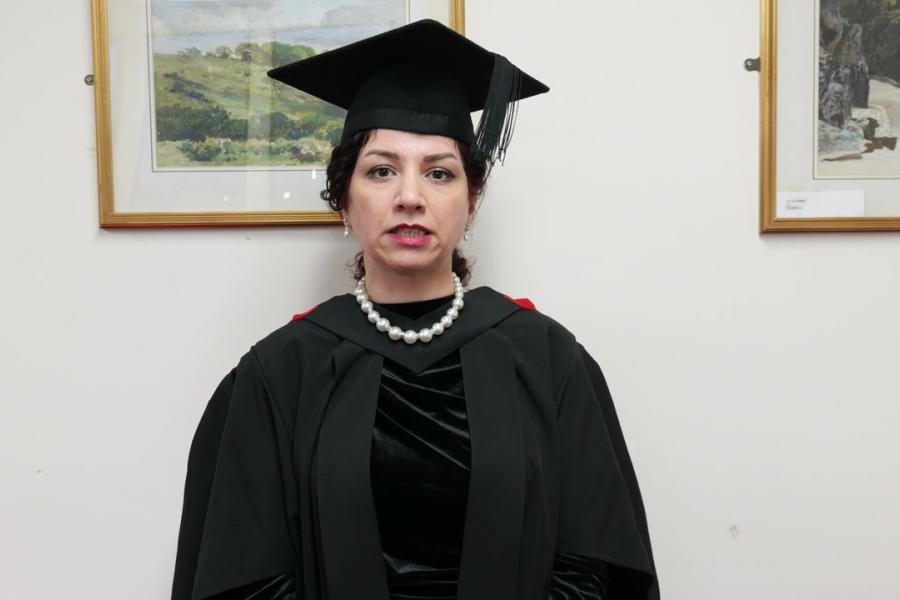About This Course
Bangor University’s Masters in Linguistics provides postgraduate-level training for students who wish to develop a deeper understanding of the empirical, theoretical, and conceptual aspects of Linguistics.
This course is designed for home and international students with a strong interest in linguistics. Two possible paths are offered: one for students who have a BA in Linguistics and want to pursue more advanced studies in the discipline, and one for students with an undergraduate degree in any other subject wishing to achieve a qualification in linguistics.
We are an accessible, friendly Department whose staff are passionate about passing on their expertise and subject knowledge as well as committed to delivering the highest quality learning experience. Our research informs our teaching provision at all levels, meaning you'll learn about topics we're researching right now. Students benefit from enthusiastic staff at the cutting-edge of academic enquiry. Our staff are committed to providing an excellent student experience with strong personalised support throughout the duration of your MA in Linguistics.
Following taught components, students on this degree will complete an independent research-based Masters level dissertation. The staff in our Department provide excellent personalised supervision and academic support for dissertations on a wide range of topics in Linguistics using applied, theoretical, experimental, corpus-based or ethnographic frameworks. These include, but are not limited to:
- Psycholinguistics
- Child language acquisition
- 2nd language acquisition
- Discourse analysis
- TEFL (Teaching English as a Foreign Language)
- SLA and language teaching
- Corpus linguistics
- Sociolinguistics
- Language and communication
- Phonetics & phonology
- Morphosyntax
- Semantics and pragmatics
- Historical linguistics
- Language variation and change
- Language and communication
- Bilingualism and multilingualism
- Language disorders
- Cognitive Discourse Analysis (CoDA)
- Welsh linguistics and language technologies / natural language processing (NLP)
Students on our Linguistics MA can use state-of-the-art learning facilities which include:
- A professional grade sound / recording studio and speech laboratory (with Yamaha, Alesis and RØDE recording equipment)
- An eye tracking laboratory (with a Tobii Pro X2-60 eye tracker)
- An event-related potential (ERP) laboratory (with an actiCHamp Plus ERP machine)
- And dedicated corpus-linguistics software and resources.
Our staff also have expertise in and provide support for the following:
- Statistical software such as: SPSS, R-Statistics and Excel.
- Experimental psychology software such as E-Prime, GORILLA Experiment Builder, Open Sesame and Webexp.
- Acoustic and phonetic analysis software such as: Audacity, Praat, and SIL Speech Analyzer
- Standardised psychometric /language tests (e.g., EVT, BPVS, NARA, WISC, K-BIT, TROG, CELF)
- A wide range of specialized corpora and concordance software including CHILDES and CLAN
At Bangor you will be part of a vibrant, innovative research community which is supported through various events throughout the year, ranging from individual talks to informal seminars and workshops to large conferences. Many of these are open not just to academic staff, but also to students and to the general public.
My name is Elham Taheri, and I have studied applied linguistics for Tefal teaching English as a foreign language.
First of all, I enjoyed being taught by very professional teachers.
Of course, I have studied English language before, but this time it was more professional and I loved that.
It's a cosy place and a friendly one.
And the course, because it has both theoretical parts and practical part is really helped me.
I learnt a lot, not only in classes but also in the practical situations, using the theories that are used in my classes.
And as I said, because of the professional teachers here, I learnt a lot
Right now, exactly. After I finished my course here, I moved to London and fortunately found a job in a college in London.
I didn't think I did that easy, but fortunately because I was graduating from Bangor university,
it was easy for me to find a job and I loved my job as a teacher.
Course Content
What will you study on this course?
Compulsory Modules
Foundations of Linguistics - This module provides an overview of the discipline of language science. In particular, it covers key ideas and methodologies in the study of meaning, grammar and sound. *Students with prior coursework in linguistics may be able to substitute Foundations of Linguistics for the equivalent number of credits from a list of Optional Modules*
Linguistics Research Methods - This module provides the necessary foundations, training and tools to design and carry out qualitative, quantitative, experimental or ethnographic research within linguistics, as well as the training and experience to develop, design and carry out an independent Master’s level research-based dissertation project employing the usual conventions in linguistic / applied linguistic literature.
MA/MSc Dissertation - In this module students will conduct a small-scale, yet significant piece of individual research to an advanced level and write a 15-20,000-word dissertation on it. Students are assigned a member of staff whose research interests best and/or most closely connects with the topic as a supervisor. The supervisor will assist the student to focus the scope, methodology and content of their dissertation, as well as giving advice throughout the project. Under the guidance of the supervisor, students will focus and fine tune their research question, survey relevant literature, plan the project, decide on a methodology, consider the need for ethical approval and act accordingly, collect and analyse data (depending on the nature of the research) utilising an appropriate analytic framework, and write up the project to form the dissertation which will address the research question in light of the findings
Optional Modules
Modules vary from year to year, they include:
- Language and Communication
- Historical Linguistics
- Psycholinguistics
- Language Change
- Language Contact & Bilingualism
- Child Language Acquisition
- Language Disorders & Bilingualism
- Bilingualism and Acquisition Issues
- Speech Science
- Phonology in Bilingual Acquisition
- L2 Speech Learning
- Welsh Linguistics
- Cognitive Discourse Analysis
- Using Corpora: Theory & Practice
- EFL Theory
- SLA and Language Teaching
- Teaching EFL
- Language Technologies/Technolegau Iaith
Non-native English speakers may be asked to take zero-credit courses with ELCOS to help with their English, unless exempted by their tutor.
Course content is for guidance purposes only and may be subject to change
Modules for the current academic year
Module listings are for guide purposes only and are subject to change. Find out what our students are currently studying on the Linguistics MA Modules page.
Course content is for guidance purposes only and may be subject to change.
Entry Requirements
A 2.ii undergraduate degree or equivalent in a relevant subject (e.g. Linguistics, Modern Languages, Translation, Psychology, English Language/Literature, English Education/English Language education).
Applicants with equivalent qualifications or experience and applications from working professionals with non-graduate qualifications will be considered on an individual basis. Please contact us for more information.
For students whose first language is not English an IELTS score of at least 6.0 (with no element below 5.5) is required.
Careers
An MA in Linguistics will give you a detailed understanding of how language works and the ability to conduct research at various levels of linguistic analysis. Graduates find career opportunities in communications, teaching, publishing, research. The transferable skills acquired through this programme are beneficial in a range of other careers, including advertising, journalism, consulting etc. After successful completion of the MA in Linguistics, you may also decide to pursue an academic career in Linguistics, by applying for a place on the PhD in Linguistics.



